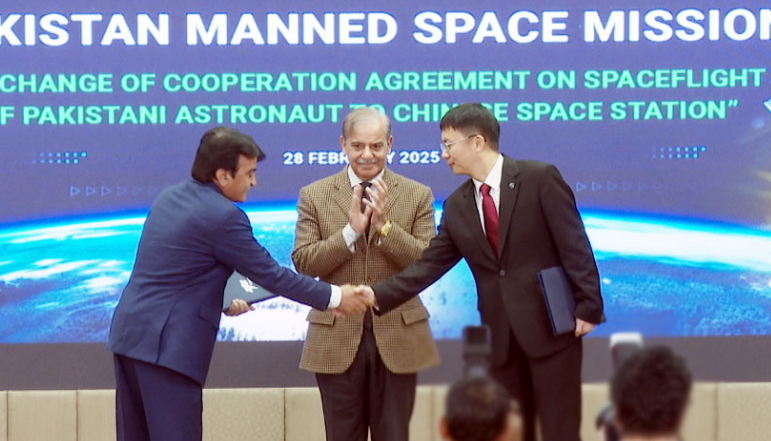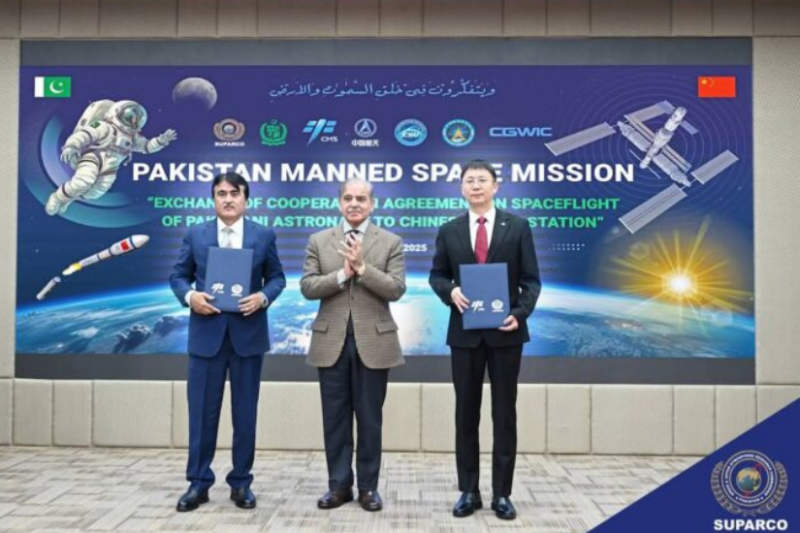Islamabad (Web Desk/Agencies): Prime Minister Shehbaz Sharif announced that Pakistan, in partnership with China, is set to send its first astronauts to China’s space station.
Addressing the ceremony following the signing of a cooperation agreement between Pakistan’s Space and Upper Atmosphere Research Commission (SUPARCO) and the China Manned Space Agency, the prime minister expressed his gratitude for China’s continued support and emphasized how this collaboration further strengthens the ties between the two nations in the realm of space exploration.

He noted that the space program under the leadership of Chinese President Xi Jinping has made remarkable progress, not only advancing rapidly but also contributing to large-scale projects like the China-Pakistan Economic Corridor (CPEC).
These initiatives have transformed Pakistan’s infrastructure and contributed to the country’s development in significant ways.
The prime minister highlighted the importance of this partnership, stating that Pakistan’s involvement in the China Space Station program is a reflection of the long-standing friendship between the two countries.
He also expressed optimism that this collaboration would not only foster greater scientific cooperation but also align with the global mission of peaceful space exploration for the benefit of all humankind.
As part of the agreement, two Pakistani astronauts will undergo rigorous training at China’s Astronaut Centre, with one of them selected to specialize as a scientific payload expert.
This preparation will enable the astronaut to conduct specialized research aboard the China Space Station (CSS). The selection process for the astronauts is expected to be completed by 2026, and they are anticipated to participate in an upcoming mission based on the station's scheduled plans.
The first mission of a Pakistani astronaut to the China Space Station will focus on conducting high-level scientific experiments across several fields, including biological sciences, medical research, aerospace engineering, space radiation, microgravity studies, and more.
These efforts are expected to make significant contributions to various areas of scientific inquiry.
Minister for Planning and Development Ahsan Iqbal termed the agreement as a milestone in Pakistan’s space journey.
He emphasized its role in boosting the country’s technological capabilities, building capacity, and fostering innovation in research. The collaboration is seen as laying the foundation for Pakistan’s sustained progress in human spaceflight and exploration.
Director General of the China Manned Space Agency, Dr. Lin Xinqiang, voiced his enthusiasm for the new partnership, reaffirming China’s commitment to expanding international cooperation in the field of space exploration.
He echoed the sentiment that this cooperation would strengthen ties between the two nations and contribute to humanity’s collective advancement through peaceful space endeavors.
SUPARCO’s Chairman, Mohammad Yousaf Khan regarded the agreement as a pivotal moment for Pakistan's space ambitions.
He urged the nation’s youth, academics, and professionals to take an active role in the country’s astronaut program, encouraging them to contribute to the country’s space exploration initiatives through innovation, research, and skill development.
Speaking about the initiative, Minister for Information and Broadcasting, Attaullah Tarar, shared his optimism that the astronaut training program would be completed within the year, paving the way for the first Pakistani astronaut to join the Chinese space mission.
He reiterated that PM Shehbaz-led government is strongly committed to advancing Pakistan's capabilities in space exploration, with a focus on nurturing scientific innovation and excellence.
This new collaboration presents an exciting future for Pakistan in the field of space exploration, opening up new avenues for scientific research and technological advancement.


